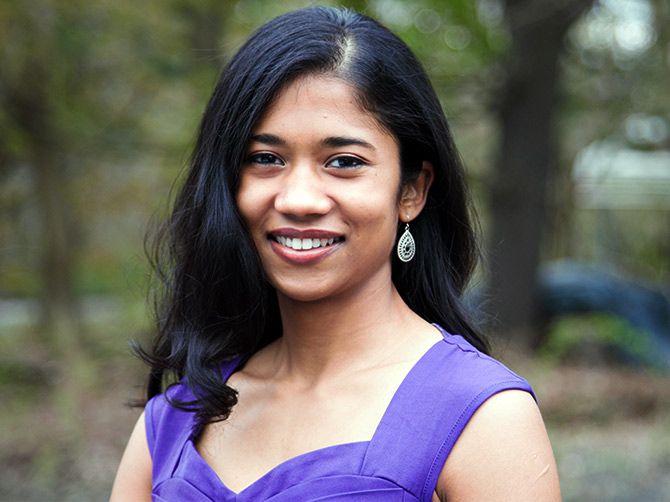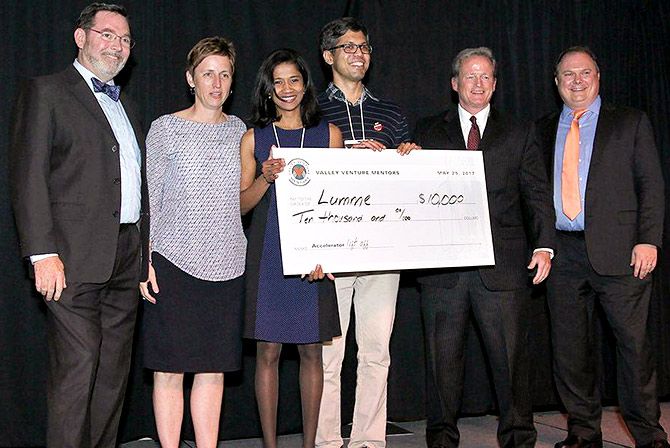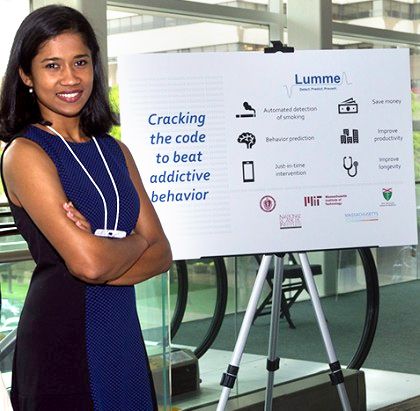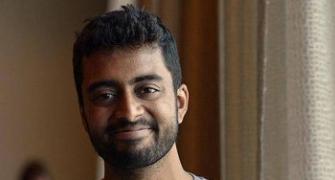'Running a start-up is hard.'
'We almost always will have obstacles.'
'There are two ways to tackle it.'
'We can either take them head on or let them hold you back.'
Meet innovator and entrepreneur Akshaya Shanmugam, one of Forbes magazine's prestigious 30 under 30 Class of 2018.

Meet the other young Indian entrepreneurs on the list
Photograph: Kind courtesy Akshaya Shanmugam
Akshaya Shanmugam is just 29.
She has an earned an engineering degree and a doctorate.
She has developed software that helps smokers quit.
She has co-founded a company.
And she has found a spot among the innovators and entrepreneurs in Forbes magazine's 30 under 30 Class of 2018.
The Chennai native -- she did her schooling at Chettinad Vidyashram, and engineering at Meenakshi Sundararajan Engineering College -- who is now based in Amherst, Massachusetts tells Rediff.com's A Ganesh Nadar about Lumme, the young company that has already 'raised $1.7 million in non-dilutive funding'.
What was your major in engineering? How did you switch to health care?
My masters and PhD were from the electrical and computer engineering department at UMass Amherst, but my research was in biomedical engineering.
I developed hardware and software systems for medical applications.
The goal of my research was to develop systems that push the boundary of health monitoring and disease screening.
What made you think about addiction?
Addiction is one of the neglected diseases in many nations around the world.
In the US, less than 10 per cent of the individuals battling addiction receive treatment.
This is due to resource limitation and costs associated with seeking treatment.
Technology that is designed around the needs of the patients and comprehensively tested would not only solve this problem, but revolutionise how addiction is treated today.
How does your system helps smokers?
Lumme's technology combines machine learning, wearable sensors, and behavioural psychology to offer key insights about health and delivers tailored treatment for every patient.
Our platform uses data from a smartwatch to continuously track the user's hand gestures.
Underlying machine learning algorithms analyses this data to automatically detect when the user is eating, drinking, smoking, or exercising.
The platform also tracks contextual information associated with each activity and warns the user when they most likely to overeat, smoke, or indulge in other unhealthy behaviour.
Clinically validated personalised interventions are delivered to the user's phone to help them handle their cravings.
Can this same system be adapted to drug users and alcoholics?
Lumme's first product is a comprehensive, personalized smoking cessation software platform.
Existing smoking cessation products and service address only one of five elements in treating addiction.
Lack of an effective quit programme is a problem faced by 25 million smokers in the US.
Other products in our pipeline focus on treating eating disorders, alcohol addiction, obesity related disorders, and monitoring bariatric patients.
Other work-in-progress projects include platforms to monitor marijuana use and opioid addiction.
Will it be able to detect the behaviour of a person in depression?
This is not our current focus, but the platform can potentially be used to monitor and treat mental disorders as well.
What does 'Lumme' mean?
Lumme in British English is an expression of surprise or interest.

Shanmugam, third from left, was pursuing her PhD when she met Abhinav Parate, third from right, who was working on a thesis with wearables.
Together they set up Lumme. Photograph: Kind courtesy @LummeInc/Facebook
What were the problems you encountered when you started out on this venture?
We had struggles similar to any start-up -- identifying and piecing together key elements like the business model, market segment, and other processes.
We realised early on that these are as important as the technology itself.
Exploring and identifying these processes was our biggest challenge.
Having said that, it was also what we enjoyed the most.
How did you get your funding?
Lumme is mainly funded through Small Business Innovation Research from the National Institutes of Health.
We have also received other small government grants and funds from accelerator programmes.
Is it easier for men to get funds than women?
Irrespective of age, nationality, gender, or other traits, running a start-up is hard.
We almost always will have obstacles.
I believe there are two ways to tackle it. We can either take them head on or let them hold you back.
How many people work for you?
Lumme's team consists of five members, including me.
Dr Abhinav Parate is a PhD in computer science, who has done seminal work in using mobile sensors for health applications (and the company's chief technology officer).
Professor Deepak Ganesan from the University of Massachusetts is a renounced scientist in mobile sensors and digital health (and Lumme's president).
Dr Sherry McKee from the Yale School of Medicine is the nation's leading expert in addiction and is the director of the Yale Tobacco treatment clinic (and Lumme's behaviour change expert).
When will we see your product in India?
We will be taking pre-orders for our product and will be launching pilots in the US during the first quarter of 2018.
Our main focus in 2018 will be US markets before we expand internationally.
What would your advice be to entrepreneurs?
I believe that there is an entrepreneur in all of us. We all have something unique to offer to this world.
It is always about identifying those key skills and finding a job that is a good fit for you.
When you start a company, there is so much going on at the same time. It is easy to lose sight of what is important and get carried away by the day-to-day activities.
I would encourage entrepreneurs to create a mental checklist.
Here are the questions I ask myself every day.
One, am I making meaningful contributions to my company?
Two, am I learning something new?
Three, is our contribution helping people lead better lives?
Do you feel youth have a better chance of success with start-ups than say a 50 year old?
I don't think that age affects chances of success.
The key advantage for youth is the ability to take risks. With age comes experience and credibility.
What increases the chance of success is bringing the right kind of people together with unique offerings to form a stellar team.










